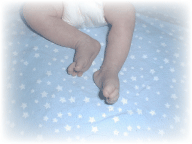Articles

Diapers - The Dirty Details
by Kris CormierOne of the many questions a mom is asked (right after "boy or girl?" and "breastfed or formula fed?" are fired off at us) is "Are you using disposable diapers or cloth diapers?". This is certainly a question you may have asked yourself at some point(s) during your pregnancy or your baby's newborn days. It's also something that can change over the months and years and is not set in stone. There are many advantages and disadvantages to either choice. Let's take a quick peek at what's available out there...
The choice that seems to be popular in the hospital is to just go with disposable diapers. When you are not at home and able to access your own washing machine, this may be the best option for you. Newborn bowel movements are their own kind of "special" and you'll hopefully (and thankfully!) never again see those kind of stools. Green and sticky, the meconium small babies produce in the first few days is difficult to wipe up and wipe off your new little bundle. If you do have a partner and/or baby's dad helping you in the hospital, I'd suggest this as a main task to be taken off your hands so you can concentrate on recovering from the delivery and on caring for your baby.
An important thing to check on (if you are still pregnant) is whether or not your hospital or birthing centre supplies diapers. Some require that the parent(s) bring diapers for the new baby and some provide those tiny little newborn-size diapers (with or without cut-out for the umbilical cord). If you do need to bring your own - pack quite a few. One of the ways you'll be able to tell if your baby is getting enough nutrients from collustrum (and then milk once your supply comes in, or formula if needed) is by the amount she or he wets diapers. For this reason (and to help avoid any uncomfortable diaper rash on baby's part), you'll want to change diapers frequently (as soon as you notice one is wet) and you may go through 6-12 per day.
Once you are out of the hospital, your choices for diapering expand... You can choose to continue using disposable diapers if you did so in the hospital, you can switch to cloth diapers that you'll wash at home, or you can arrange for a diapering service. Whether you are buying single-use diapers, buying cloth diapers to be laundered yourself, or setting up a service, it's ideal to have everything purhcased and arranged before your baby arrives. Of course, you can always mix and match these options as well! Some moms stick with cloth diapers when they are at home but will pack disposables when they take baby out to avoid toting dirty diapers and cloths with them after they've been soiled.
Here is a little bit of info about each of these 3 main options:
Disposable diapers have the advantage of being very easily available as many stores carry them - from grocery stores to pharmacies to department stores. Even some gas stations or corner stores may carry a few in the hopes that a family has run out unexpectedly and will stop in to grab an emergency supply but be wary as the prices are marked up significantly. On the flipside of this coin, buying in bulk has advantages here as well. If you know your baby will be in her or his current size for a little while longer, you can buy large boxes of diapers to save money on a "price per diaper" basis. Depending on the diaper brand you choose, you might be able to collect points for every purhcase of wipes and diapers and redeem them for toys for your baby. However, even if you're buying in bulk and gathering points, the high cost of diapers really adds up over the months and years as compared to cloth diapers. You will spend a lot more for the convenience factor.
The main disadvantage of disposable diapers, besides the cost, is the fact that they are thrown away in large numbers and spend a very long time in landfills. Since they are made of plastics and other non-organic materials, they don't biodegrade. Millions of babies born each year add up to billions and billions of diapers tossed into the garbage! That's a lot of waste, especially considering that although parents are suposed to dispose of any human waste products into the toilet first, I imagine many or most do not! With our earth becoming more polluted and damaged due to toxins in the ground, air, and water, it's more of a priority than ever to preserve what little landfill space is left. Many parents who feel strongly about the environment will choose cloth diapering over single-use diapers for this reason.
Cloth diapers are now easier to obtain and to use, but they still carry with them extra work and effort. Once used, they must be properly stored until they are ready to be washed and then need to go through the laundry machine or otherwise be washed out. Since the nature of the waste is human excrements, the water used for the washing needs to be hot enough to have a sanitizing effect. Some cloth diapers have flushable or toss-able inserts that you can use to absorb the bulk of the waste and keep the diaper cover itself cleaner.
As far as cost goes, you save a lot over the long term on the purchase price of the diapers. Even if they are more expensive up front, you can use them over and over again instead of continuing to buy more. A supply of a dozen or two will last you for the time your baby's in that size and may stay in good enough condition to last for future babies as well. If you buy diapers that adjust to fit your baby's current size, you can extend the time you'll be able to use the diaper cover for. Overall, these cost savings from using only a couple dozen cloth diapers over a baby's first couple years far outweigh whatever costs you would incurr from the extra hot water and laundry detergent needed to wash them.
There is also something to be said about the effectiveness of using cloth diapers when it comes time for a toddler to learn how to use the toilet independently. Feeling the wetness of a peed diaper against her or his skin could perhaps help a child understand what it means to pee a diaper. If they are uncomfortable with a soiled diaper, they might feel more motivated to make it to the toilet next time. Some moms feel that cloth diapers are less likely to lead to rashes on their babies' diaper areas as well.
Diapering Services can seem to be a "best of both worlds" option for some families. They can enjoy using cloth diapers, helping the environment, and the possibility of easier toilet training, but don't have to be burdened with the task of washing all those diapers. After you find a service in your city, you'll be set up to receive a delivery of fresh clean diapers (weekly or on whatever schedule is available in your area) and have the soiled diapers picked up. It is recommended that you're sure to have a well-sealed diaper pail as well as a deoderizer puck or powder if you are going this route. After all, you wouldn't want your baby's nursery smelling like a dirty diaper all week!
On the other hand, services can also be seen as being the worst of both worlds because you still have the high cost of diapering your baby without the convenience of disposables. If you take your baby out somewhere, you still have to pack away the cloth diaper and get it home so you can have it washed by the service. But services are noticing that this inconvenience is a deterant for parents and some offer options to help out. Some services provide toss-away wipes instead of cloth wipes so that parents can still have that method of wiping while still being able to contribute to the environment by having the bulk of the materials be re-usable. Additionally, some services will also deliver a small "supplement" of single-use diapers to be used when it's not convenient for you to bring along your cloth diapers. It seems as though you can tailor your cloth diaper use to whatever your needs are at the time, and I'm sure a service would want to work with you to do this as they would still have your service for part of the time.
As a parent of school-aged children, I'm thankful that my diapering days are over. Looking back, I wish I had used a diapering service for at the very least my youngest child as I think we could have managed it and it would have meant so many fewer diapers now sitting in landfills (thousands!). When evaluating all of the options out there, I think the best approach would be using cloth diapers for the bulk of a baby's diapering time and then relying on disposables if you felt that was more convenient for occasions like going out to playdates or for vacations and trips. But every family is different and the options need to considered with your own family and children in mind! I hope this article helps you decide on which diaper options are right for you and your little bundle!
Other Diaper Resources:
- Today's Parent magazine published a great summary of cloth diapers available on the market in their November 2009 article: Best "green" diapers.
- Diaper Jungle has lots of information about using cloth diapers (choosing the right ones, sewing your own covers, as well as how to wash and organize them).
- The Real Diaper Association has info on cloth diapers as well as a local directory where you can find out if your area has a local chapter of the organization.
- Cloth Diapering Trading forum (on Cafemom).
- Pampers ~ one of the big ones in disposable diapering, the points program lets you get rewards back from purhcasing diapers and wipes.
- How to Find a Cloth Diaper Service from ehow.com.
- Happy Nappy ~ diapering services that delivers to 4 Canadian cities.
Author bio: Kris Cormier is a young mom of two wonderful spirited children. She lives in Ottawa, ON with her kids and spouse of 6 years. She began running the Young Mommies Homesite when she was an 18-year-old single mom of her first child, and has been the (unpaid volunteer!) Site Director for over a decade now. Although she lives with daily pain resulting from an MVA in 2008, she still tries to be a WAHM and help out other teen and young moms. * This article is © Kris Cormier 2010 and may be printed without the author's permission for personal use only. It may not be distributed, modified, or sold. |
 If you have a non-commercial article
that you would like to publish on this
website, please
e-mail the webmaster
for more information. All submissions are welcome, and those that are published will
be credited to the author, with a return e-mail address and website link included
if applicable.
If you have a non-commercial article
that you would like to publish on this
website, please
e-mail the webmaster
for more information. All submissions are welcome, and those that are published will
be credited to the author, with a return e-mail address and website link included
if applicable.

|













